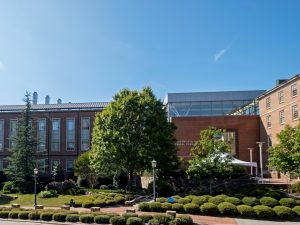COIL Program Q&A with Gillings School of Global Public Health
March 2, 2022
Gillings School of Global Public Health

Gillings School of Global Public Health. (Photo by Jon Gardiner/UNC-Chapel Hill)
We at Research, Innovation and Global Solutions interviewed Le Minh Giang, Associate Professor in Epidemiology/Global Health, Hanoi Medical University; Vivian Go, PhD, Professor, Department of Health Behavior, Gillings School of Global Public Health; Natasha Hughes, MPH candidate in Global Health, Gillings School of Global Public Health; and Nguyen Duc Khanh, MPH candidate in Epidemiology, Hanoi Medical University, about their experience in the Collaborative Online International Learning (COIL) Program.
CAN YOU TELL US ABOUT THE PARTNERSHIP BETWEEN GILLINGS AND HANOI MEDICAL UNIVERSITY?
Dr. Le Minh Giang: The partnership between Gillings and Hanoi Medical University (HMU) has started quite a few years back. Various activities included: HMU hosting Gilling’s pre-doctoral students, one HMU faculty obtaining PhD at Gillings, and several small research studies. Most recently, two major projects cemented the collaboration, including an implementation science study to improve linkages to HIV care among people who inject drugs and are HIV positive and a training program to improve implementation science research capacity for HMU and other institutions. Both project are funded by US NIH.
Dr. Vivian Go: UNC-Vietnam project has been collaborating with Hanoi Medical University over the last decade on a range of NIH-funded HIV, mental health and implementation science studies for vulnerable populations including people who inject drugs, men who have sex with men and transgender people. Most recently, HMU/UNC was awarded an NIH D43 training grant to build implementation science capacity across health science universities and health departments in Vietnam.
CAN YOU TELL US ABOUT THE COIL PROGRAM?
Dr. Vivian Go: Collaborative Online International Learning (COIL) is part of an initiative sponsored by the Office of the Vice Provost for Global Affairs. COIL courses involve shared learning between students in a course at UNC-Chapel Hill and peer students at a global partner university.
Over the fall 2021 semester, our instructional team implemented COIL program for interested students taking HBEH 784 — Implementation Science in Global Health. This 3-credit, masters-level course is required for global health MPH students at Gillings, and is co-taught by me and Brian Pence. The COIL program provided MPH students the unique opportunity to work with a group of students from Hanoi Medical University (HMU) and exchange experiences and perspectives on the challenges of translating evidence-based interventions into real-world settings. In implementing COIL, the UNC instructional team worked with a collaborating group of instructors at HMU to engage in the following activities: course planning and preparation, including syllabus and Sakai site development; developing lecture materials; facilitating class sessions and discussions; coordinating in-person and virtual course logistics; providing support to students through feedback on assignments; and answering student questions.
CAN YOU GIVE US AN OVERVIEW OF HIV TREATMENT/PREVENTION IN VIETNAM?
Dr. Le Minh Giang: Over the past decade or so, with support from PEPFAR (The US President Emergency Plan For AIDS Relief) and the Global Fund, Vietnam has made great progress in terms of providing HIV treatment and HIV prevention for vulnerable populations. The HIV treatment coverage has reached about 70% of people living with HIV, and the PrEP program has reached about 30,000 people over the past two years. Despite such progress, there are still many inequities in terms of program access and quality. For example, people who inject drugs still fare worse as compared to other vulnerable groups. Or stigma still is a major barrier for people living with HIV to get access to services, HIV and otherwise, improve their overall health and quality of life.
WHAT DID YOU LEARN FROM ENGAGING WITH THE COIL PROGRAM?
Dr. Le Minh Giang: I myself have appreciated the ways in which UNC faculty prepare and conducted class sessions. All sessions helped students to apply what they learn almost immediately and encourage engagement of all students.
Dr. Vivian Go: I enjoyed collaborating with our HMU colleagues and learning about the MPH curriculum at the HMU School of Preventive Medicine more broadly, and about the implementation science course syllabus, more specifically. The MPH courses are taught one at a time, for three-week periods at HMU and the teaching style tends to be more didactic in nature.
Natasha Hughes: Engaging in the COIL program allowed for me to truly see the essence of global public health in action. I learned how to engage with stakeholders with a more realistic and accurate depiction of various issues. In global health related classes, we talk a lot about global health issues that affect various locations and communities around the globe. Participating in this program allowed to see what engaging members of this community is really like as a public health professional. We were able to practice cultural humility while participating in these projects through taking a step back and communicating with stakeholders about the needs of the community.
Nguyen Duc Khanh: Implementation science, how to apply the context of America on the proposed projects. Plus, the chance to communicate with other scientists in America and learn from how they work and exchange opinions on how we should build our implementation models.
Read more on the UNC Gillings School of Global Public Health website.
